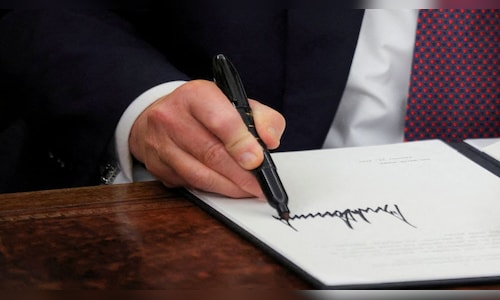The updated travel ban affects Afghanistan, Myanmar, Chad, the Republic of the Congo, Equatorial Guinea, Eritrea, Haiti, Iran, Libya, Somalia, Sudan, and Yemen. Additionally, it imposes partial restrictions on entry from Burundi, Cuba, Laos, Sierra Leone, Togo, Turkmenistan, and Venezuela.
Earlier this week, Trump attributed the presence of the Boulder attack suspect, who was an Egyptian overstaying his visa, to former President Joe Biden’s immigration policies, despite the suspect not being affected by the ban. Witnesses reported seeing him use a makeshift flamethrower and toss an incendiary device during the incident.
“The recent terror attack in Boulder, Colorado, has highlighted the severe threats posed to our nation by foreign nationals who are not adequately vetted, as well as those who enter as temporary visitors and overstay their visas,” Trump stated in a video shared on social media Wednesday. “We don’t want them.”
Trump also enacted a separate proclamation suspending visas for foreign students wishing to participate in exchange programs at Harvard University, which has been a focal point for the administration, claiming it demonstrates a liberal bias and fails to adequately address antisemitism.
In the Harvard proclamation, Trump accused the university of neglecting to discipline conduct violations on campus and argued that it had only reported information about three foreign students suspected of engaging in dangerous or illegal activities.
“Harvard’s actions indicate that it is either not sufficiently reporting its disciplinary records for foreign students or is not rigorously monitoring its foreign student population,” Trump remarked.
During his first term, Trump prevented travelers from Cuba, Iran, Libya, North Korea, Somalia, Sudan, Syria, Venezuela, and Yemen from entering the US.
The inclusion of Afghanistan in this order follows the Trump administration’s suspension of the US refugee program and the halt of federal funding for assistance programs, which previously included travel support for Afghans approved for resettlement in the US.
This action is the latest in a broad immigration agenda targeting undocumented migration, increasing deportations of individuals within the US, and completing the construction of the US-Mexico border wall initiated during his first term. Trump has committed to securing the US borders, capitalizing on voter concerns surrounding crime and a rise in migrants during his 2024 presidential campaign.
Upon taking office, Trump quickly set in motion plans to reinstate a travel ban, directing the secretaries of State and Homeland Security, the attorney general, and the director of National Intelligence to identify nations where “vetting and screening information is so deficient as to warrant a partial or full suspension on the admission of nationals from those countries.”
The travel ban is expected to encounter legal challenges, similar to those faced by its predecessor and other immigration measures instituted during Trump’s current administration, which are already under judicial review. Trump has asserted his intention to pursue an immigration policy agenda that tests the limits of his presidential powers.
The first-term travel ban was a defining moment during Trump’s presidency. In 2017, just days after taking office, he issued an order barring individuals from seven predominantly Muslim countries from entering the US for 90 days. This action triggered chaos and confusion at airports, sparked global protests, and resulted in a barrage of lawsuits aimed at halting the order, which critics labeled a “Muslim ban.”
Trump defended this course of action as essential for national security, and after initial versions were struck down by judges, he moved to issue revised orders that altered the targeted countries and provided more detailed restrictions in an effort to withstand further legal scrutiny.
These subsequent changes eventually culminated in a 2018 US Supreme Court ruling that upheld the travel ban in a 5-4 decision, dismissing claims that it discriminated against Muslims and granting Trump a significant legal victory that reinforced presidential authority over US borders. Biden, in one of his first official acts in 2021, rescinded Trump’s travel ban.
Nonetheless, Trump has promised to reintroduce and expand the ban to include refugees from Gaza if he is elected in 2024, a measure that aligns with a critical element of his agenda.
Since assuming office, the president has declared a national emergency at the southern border and directed the Pentagon to allocate additional resources to manage the situation.
The administration has also escalated deportations of undocumented migrants and sought to eliminate automatic birthright citizenship for children of individuals in the country illegally, though this effort has been temporarily halted by the courts amid ongoing legal disputes. However, this move coincides with a reported slowdown in deportations, which initially featured high-profile raids across the nation.
Furthermore, the president has employed tariffs to pressure Mexico and Canada into taking greater action to secure the border and has directed agencies to identify federally funded programs that provide benefits to undocumented migrants.
There has been a noted decrease in unauthorized crossings at the southern border, with Border Patrol agents registering 8,300 illegal crossings in February, marking the lowest monthly total in decades.



